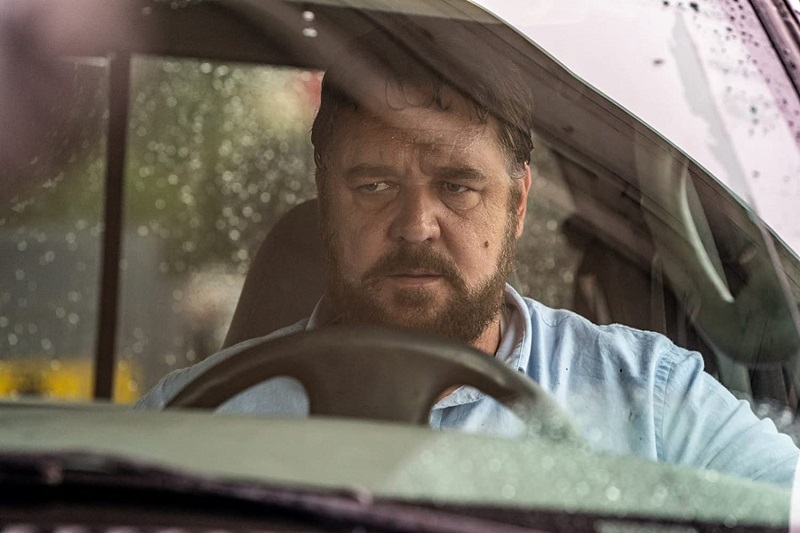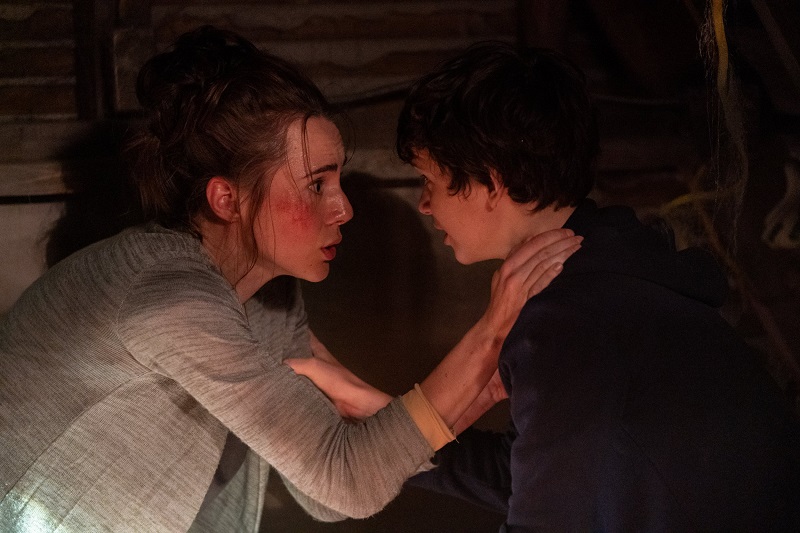Unhinged had billed itself as the first movie that was going to get you back into movie theaters. Time has shown that is not going to be the case, that “honor” will go to some other film down the line as the latest flick starring Oscar winner Russell Crowe is debuting On Demand and digitally across various outlets. Its story of a road rager taking it too far is about much more when one dares to look deeper and perhaps seeking answers to why someone like Crowe’s “The Man” (seriously, that’s his character’s moniker) becomes Unhinged.

The film opens in a way that even describing it would be seen as a spoiler. So, let’s just say, it opens violently and as such, it introduces us to The Man. Some could argue that the introductory scene explains his behavior and why a simple road rage incident would turn into a crime spree with people getting run over, set on fire, stabbed with a butter knife in the back of the head and so much more.
The thing is the landscape that Unhinged is released into is one that is hypersensitive to lawlessness by white males… and rightfully so. As such, those behind the film may be opening themselves up to criticism in arenas that aren’t solely restricted to filmmaking. Although it came out two decades ago, Falling Down seems to be the bar for which all frustrated white guy movies are measured. Comparing these two films and these two guys is perfectly fair. One glaring difference is the society that exists in 2020 versus 1993.
Where Falling Down works and Unhinged misses the mark is something that has been integral to all films’ effectiveness in its storytelling narrative and that is character motivation. The opening moments of Crowe’s film is shrouded in mystery in terms of the “Whos” and “Whys.” Someone really hurt this guy. Either one of two things can emerge from audiences after what Crowe does at the beginning of Unhinged. Audiences can be driven to dissect everything that occurs from that point on through glasses colored with that violent opening, or in our quick to attach blame culture currently, we are left to glean that this is an unstable man in a perfect storm of subjects for his anger and means to achieve his vicious retribution on every single soul that gets in his way and thus becomes part of the problem and not the solution he seeks.
Michael Douglas was motivated by generational issues, feeling as if he had been tossed aside by a society that doesn’t deem him worthy anymore. He had an ex-wife and child visitation issues that only further fanned his overall frustration with life in general. In no way do these problems excuse what he does across Los Angeles on that fateful Falling Down day, but the audience can go along for the ride keenly knowing what drives him and as he figures out what he wants, so too do we as it happens. For Crowe’s The Man, his motivations are as mysterious as his name. In terms of what gets in his way on this fateful day is a single mom who seems to be put upon in the same manner that drove Douglas’ D-Fens character to exit his car on that LA freeway and take what would prove to be his Swan Song.
Rachel (Caren Pistorius) has an ex who to call flakey would be an upgrade. That weighs on her because her son Kyle (Gabriel Bateman) is at a formidable age where a father figure is incredibly helpful in the boy becoming a man department. Rachel’s brother Fred (Austin P. McKenzie) and his girlfriend live with them as money is extremely tight. We learn that Rachel’s hairdressing freelance work is not going well. To make matters worse, she can’t seem to wake up on time, and thus, her son is continually late to school (complete with detentions for his tardiness). On the way to school one day, The Man and Rachel’s paths cross. Kyle mistakenly rolls down the window, so we hear clearly Crowe’s issues with the lack of a “courtesy tap” instead of a blaring horn, which is what she did deliver to a man not in the best of moods to take such an auditory assault. He becomes instantly obsessed and is determined to make sure she gets a front-row seat to what a “really bad day” looks like… since The Man is sure Rachel has never experienced such a thing.
How Crowe seems to find Rachel when she (and we) feel like she has “lost him” is handled in a clever manner throughout Unhinged. The actual tension in the scenes between stalker and stalked is gripping, that much is true. We are actually more vested in Rachel’s effort to shed this maniac than why the nut roll is turning his ire on this single mom. I guess that works because we are pulling for her and her son to live another day, but the threat coming at her is missing any kind of exposition. Not that his behavior would be warranted, but it would be nice to have some reason why this trail of bloodshed follows him across the city.

What Unhinged does achieve well is grab us and wrap us in a blanket of fear that defines Rachel and her existence throughout. Although probably not too hard to channel dread when an off-kilter Crowe is coming at you with tenacity and a tenor that is pure unadulterated brooding assault. But it is achieved by director Derrick Borte in a way that puts us in the car with mother and son. I’m sure many of you witnessing Borte’s film have had first-hand experience with a road rager and the subsequent terror that accompanies the moment. That kinship brings a palpable panic that is anxiety raising. While in it, one can forget that this human missile of destruction that is Crowe’s The Man comes from an empty place. When all is said and done, though, the Unhinged experience is equally as empty.
Back to Falling Down and its cousin in arms, Unhinged. Douglas’ ire was stoked as he traversed an Angelino landscape that was as unforgiving as he was staid in his ways. By its conclusion, he was defined as part of a generation that gave their all to the Cold War and will never be someone who gets a medal, or even a mention in the thank yous of a president for a battle well fought. It didn’t excuse D-Fens and his behaviors or actions. After all, Falling Down’s screenwriter Ebbe Roe Smith shared a sentiment with Unhinged’s writer, Carl Ellsworth. Both felt similarly about their title characters. They didn’t deem it necessary for their tale to give their leads traditional names. After all, they would be defined by their actions. Thing is, Douglas was given much more to work with than Crowe was and by the conclusion of the latter’s film, we don’t have a sense of loss like was achieved with Falling Down. It was as if we as a society had failed him, whereas in Unhinged, that little bit of information never arose and thus the exercise felt hallow.
Grade: B-

